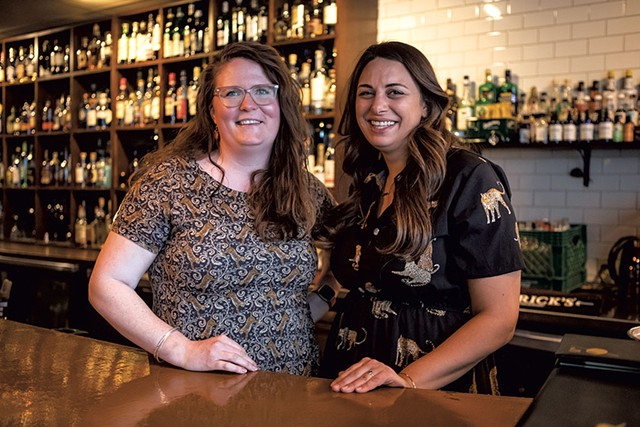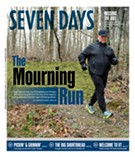Published March 22, 2023 at 10:00 a.m. | Updated March 24, 2023 at 11:18 a.m.
When Emily Morton and Karyn Jacobs decided last year to buy the 126, the small Burlington nightclub where they worked, they had a carefully thought-out financial plan. The first-time business owners meticulously researched staffing, music booking and other operational costs.
"There were so many things to take in consideration and budget for," Morton said recently, as she and Jacobs sat in their office at the 126. "But insurance was one of the things we weren't worried about."
As it turned out, finding insurance for their bar was a big problem. Their landlord initially demanded they take out a million-dollar liquor liability policy, in case a drunken customer of the club later caused an accident or injuries to someone. Vermont's so-called Dram Shop law allows the landlord, as well as the bar itself, to be sued in such a case, making many landlords trepidatious when it comes to their tenants' insurance coverage.
So Jacobs and Morton went shopping, expecting to pay similar rates as the previous owner had for coverage. But despite submitting more than 25 applications to different brokers, at the national and state levels, the women had no luck.
"It wasn't about how much the coverage would be," Jacobs said. "We couldn't even find coverage. No one, not a single insurer in the state, could offer us a plan."
The women also discovered they were not alone: Vermont bars, nightclubs and other establishments that serve alcohol were facing sharp, often unaffordable, increases in the cost of insurance — if they could find a company to provide it at all.
The cost of liability insurance, including liquor liability, has been rising steadily across the country. A recent survey by the Council of Insurance Agents & Brokers found that in the final quarter of 2021 alone, medium-size businesses saw an average insurance premium increase of 10.6 percent; small businesses saw an average 6.3 percent rise. The council attributed the increases to inflation, bigger lawsuit awards, an uptick in cybercrime and other factors.
But Vermont's difficulties are compounded by the state's own liquor liability law, passed in 1987. Its provisions mean Vermont is one of the states where insurers run the greatest risk of big payouts in liquor liability lawsuits, according to the Insurance Service Office, which is based in New Jersey. Its assessment, used by insurance companies to make business decisions, means liability insurance has become expensive and hard to obtain for Vermont establishments.
"We are quickly approaching a critical point for restaurants, clubs, bars and music venues," said Amy Spear, vice president of tourism at the Vermont Chamber of Commerce. "When it comes to access to liquor liability, it's not even a question of affordability right now. It's whether or not a business can even get a policy."
Hearing the cries of bar owners, the Statehouse has begun to respond. Last week the House Judiciary Committee unanimously endorsed a bill that members hope would make liquor liability insurance more available, without too narrowly limiting the ability of victims to sue for damages if, for example, a bar patron drove drunk and caused an accident.
The measure, H.288, would change the liability standards that apply when a bar is sued. Currently, according to the ISO, when it comes to serving alcohol, Vermont's statutes and case law make it a "strict liability" state. That means someone can sue a bar successfully without having to prove that the establishment was negligent in serving a customer who later caused harm. And Vermont doesn't cap the damages an injured person can win.
The ISO calculates the risk that insurers take on by writing policies in each state. On a scale of one to 10, Vermont scored a not-so-perfect 10 — a distinction, along with Alabama, of posing the very highest risk. By comparison, Maine's rating is 4; Massachusetts' is 6.
As drafted by the House Judiciary Committee, the bill would more explicitly move Vermont to a "negligence" standard for most liquor liability cases (except those involving sales to a minor or outside legal hours). It also removes language that allowed landlords to be held liable. It does not cap damage awards but does require that bars and restaurants carry liability insurance starting in 2024. Some of the language in the statute would mirror Maine's law.
House Judiciary Committee chair Martin LaLonde (D-South Burlington) said he believes the ISO has been misinterpreting Vermont's existing law. Nevertheless, the committee's bill includes adjustments to meet the industry's concerns while still allowing room for injured people to recover damages, he said.
"We set out to strike a balance, and I think we did strike a balance," he told the committee as it prepared to vote out the measure last week. "[The bill] continues the incentives for good behavior by servers, by bartenders and by establishments, and it allows harm to be compensated. And hopefully — and this is the big question, and we'll find out in the next six months or so — it makes insurance more available at a more reasonable cost in Vermont."
LaLonde also said he sees the requirement that all bars carry insurance as an important step.
"We did hear that there are bars that don't have liability insurance, and without that liability insurance, individuals who are harmed are more exposed," he summed up.
Rep. Logan Nicoll (D-Ludlow), the sponsor of H.288, said the relative speed with which the bill is moving through the House is evidence that lawmakers have listened to bar owners. The bill is scheduled for a final vote within the House early this week before it can cross over to the Senate for debate.
"Hopefully the Senate doesn't take too much time with it," Nicoll said over the phone. "Because I'm worried about some of our bars."
Case in point: the Pickle Barrel nightclub in Killington.
"My carrier came to me last year and basically said that they just didn't want to write coverage for me or my businesses any longer," said Chris Karr, who owns the club, as well as five other restaurants and bars in the Killington area.
According to Karr, the insurance company was dropping him strictly because his nightclub is located in Vermont. As he shopped around for new coverage, one insurance agent confided that if his club were in New Hampshire, he would have gotten a new plan with no problem.
"If you look at Maine and New Hampshire, their [ISO ratings] are much lower than Vermont's," Karr explained. "You can see that it isn't the businesses or anything like that — it's the state."
Karr said the cost of insuring the Pickle Barrel has risen significantly over the past few years. Now he faces the likelihood that when his policy expires at the end of the year, his businesses will be without liability insurance. After hearing that other bars face the same threat, Karr joined other owners, including Morton and Jacobs of the 126, in asking lawmakers for help.
"You could see how eye-opening it was," Karr said of the owners' testimony before the House Judiciary Committee. "The legislature saw that we weren't a bunch of bar owners just trying to dodge liability. We want and need insurance, and we should be able to get that for our businesses."
As Morton and Jacobs raised the alarm with other businesses about a possible insurance apocalypse, they found most owners weren't aware of the issue or believed they were facing it alone.
"We all thought it was just us!" Morton said.
Once they established that they weren't alone, Morton and Jacobs' focus shifted to supporting H.288, on which they've pinned their bar's hopes for survival.
"Here we are, one of the only bars owned by women in the state," Morton continued. "We're first-time business owners but came into this with a clear plan, the blessing of the former owner and a great relationship with the landlord. But the whole thing was almost kiboshed because our landlord needed to protect himself and we couldn't get insurance."
Working closely with their insurance agents, the duo were able to secure the $1,000,000 policy their landlord required. That enabled them to secure short-term coverage for the year by paying significantly more than they had planned. While Morton and Jacobs declined to discuss the previous owner's rates, they revealed that the only policy they were able to find cost double what the rates had been. They also pointed out that just to get a plan twice the cost of the previous one took months of working with multiple insurance brokers who advocated for them with the insurance companies.
"If [H.288] isn't passed, I think it will definitely put out quite a few small businesses in Vermont," Jacobs said, noting that she and Morton have only a temporary fix for their problem.
Karr agrees. Although he said he is optimistic that H.288 will pass, he will close his bars if it does not. "Personally, if I can't find coverage, I'm not going to take the risk [of being uninsured]," he said.
Nicoll said he is confident lawmakers can provide some relief for the beleaguered businesses: "A lot of my colleagues are very supportive of trying to address this problem in the session. There's a lot of political capital to getting something done here."
Karr described the situation as a race against time — can lawmakers act before insurance renewal? Those dates vary from one bar to the next, and "time is not in our favor," he said.
"Bars and restaurants, we all made it through COVID and managed to get our doors open again," Morton said. "The state was so huge in helping us then. We know that we've done literally everything in our power to change the situation. We just need help."
Correction, March 24, 2023: This story has been updated to reflect that the owners of The 126 secured a $1,000,000 liability insurance plan to satisfy their landlord's requirements.
The original print version of this article was headlined "Uncovered | Rising insurance rates threaten Vermont bars, clubs and restaurants"
More By This Author
Speaking of...
-

New Marker Provides a Window Into the History of Burlington's Battery Park
May 8, 2024 -

Queen City Café’s Biscuits Are Hot at Burlington's Coal Collective
May 7, 2024 -

Abbey Duke Replaces Emma Mulvaney-Stanak in Legislature
May 6, 2024 -

Overdose-Prevention Site Bill Advances in the Vermont Senate
May 1, 2024 -

Aggressive Behavior, Increased Drug Use at Burlington's Downtown Library Prompt Calls for Help
May 1, 2024 - More »
Comments
Comments are closed.
From 2014-2020, Seven Days allowed readers to comment on all stories posted on our website. While we've appreciated the suggestions and insights, right now Seven Days is prioritizing our core mission — producing high-quality, responsible local journalism — over moderating online debates between readers.
To criticize, correct or praise our reporting, please send us a letter to the editor or send us a tip. We’ll check it out and report the results.
Online comments may return when we have better tech tools for managing them. Thanks for reading.
















































